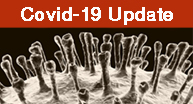Routine blood analysis greatly reduces the false-negative rate of RT-PCR testing for Covid-19.
Keywords:
COVID-19, RT-PCR, blood test, WBC, aspartate aminotransferase, lactate dehydrogenaseAbstract
Background: The COVID-19 outbreak is now a pandemic disease reaching as much as 210 countries worldwide with more than 2.5 million infected people and nearly 200.000 deaths. Amplification of viral RNA by RT-PCR represents the gold standard for confirmation of infection, yet it showed false-negative rates as large as 15-20% which may jeopardize the effect of the restrictive measures taken by governments. We previously showed that several hematological parameters were significantly different between COVID-19 positive and negative patients. Among them aspartate aminotransferase and lactate dehydrogenase had predictive values as large as 90%. Thus a combination of RT-PCR and blood tests could reduce the false-negative rate of the genetic test. Methods: We retrospectively analyzed 24 patients showing multiple and inconsistent RT-PCR, test during their first hospitalization period, and compared the genetic tests results with their AST and LDH levels. Results: We showed that when considering the hematological parameters, the RT-PCR false-negative rates were reduced by almost 4-fold. Conclusions: The study represents a preliminary work aiming at the development of strategies that, by combining RT-PCR tests with routine blood tests, will lower or even abolish the rate of RT-PCR false-negative results and thus will identify, with high accuracy, patients infected by COVID-19.
References
Coronaviridae Study Group of the International Committee on Taxonomy of Viruses. The species severe acute respiratory syndrome-related coronavirus: classifying 2019-nCoV and naming it SARS-CoV-2. Nat Microbiol. 2020.
Pandemic C-19 C. No Title [Internet]. Available from: https://www.worldometers.info/coronavirus/
Day M. Covid-19: identifying and isolating asymptomatic people helped eliminate virus in Italian village. Bmj [Internet]. 2020;368. Available from: https://www.bmj.com/content/368/bmj.m1165.long
Li Y, Yao L, Li J, Chen L, Song Y, Cai Z, et al. Stability issues of RT-PCR testing of SARS-CoV-2 for hospitalized patients clinically diagnosed with COVID-19. J Med Virol. 2020;
Xie X, Zhong Z, Zhao W, Zheng C, Wang F, Liu J. Chest CT for Typical 2019-nCoV Pneumonia: Relationship to Negative RT-PCR Testing. Radiology. 2020;
Li D, Wang D, Dong J, Wang N, Huang H, Xu H, et al. False-Negative Results of Real-Time Reverse-Transcriptase Polymerase Chain Reaction for Severe Acute Respiratory Syndrome Coronavirus 2: Role of Deep-Learning-Based CT Diagnosis and Insights from Two Cases. Korean J Radiol [Internet]. 2020;21(4):505. Available from: https://synapse.koreamed.org/DOIx.php?id=10.3348/kjr.2020.0146
Long C, Xu H, Shen Q, Zhang X, Fan B, Wang C, et al. Diagnosis of the Coronavirus disease (COVID-19): rRT-PCR or CT? Eur J Radiol [Internet]. 2020;126(March):108961. Available from: https://doi.org/10.1016/j.ejrad.2020.108961
Lippi G, Simundic A-M, Plebani M. Potential preanalytical and analytical vulnerabilities in the laboratory diagnosis of coronavirus disease 2019 (COVID-19). Clin Chem Lab Med. 2020;0(0).
Ai T, Yang Z, Hou H, Zhan C, Chen C, Lv W, et al. Correlation of Chest CT and RT-PCR Testing in Coronavirus Disease 2019 (COVID-19) in China: A Report of 1014 Cases. Radiology. 2020;
Pan Y, Long L, Zhang D, Yan T, Cui S, Yang P, et al. Potential false-negative nucleic acid testing results for Severe Acute Respiratory Syndrome Coronavirus 2 from thermal inactivation of samples with low viral loads. Clin Chem. 2020;
Yi H. 2019 novel coronavirus is undergoing active recombination. Clin Infect Dis. 2020;
Li D, Wang D, Dong J, Wang N, Huang H, Xu H, et al. False-negative results of real-time reverse-transcriptase polymerase chain reaction for severe acute respiratory syndrome coronavirus 2: Role of deep-learning-based ct diagnosis and insights from two cases. Korean J Radiol. 2020;21(4):505–8.
Ferrari D, Motta A, Strollo M, Banfi G, Locatelli M. Routine blood tests as a potential diagnostic tool for COVID-19. Clin Chem Lab Med [Internet]. 2020;1–5. Available from: http://www.ncbi.nlm.nih.gov/pubmed/32301746
Ferrari D, Lombardi G, Strollo M, Pontillo M, Motta A, Locatelli M. Association between solar ultraviolet doses and vitamin D clinical routine data in European mid-latitude population between 2006 and 2018. Photochem Photobiol Sci. 2019;18(11):2696–706.
Ferrari D, Ripa M, Premaschi S, Banfi G, Castagna A, Locatelli M. LC-MS/MS method for simultaneous determination of linezolid, meropenem, piperacillin and teicoplanin in human plasma samples. J Pharm Biomed Anal. 2019;
Ferrari D, Strollo M, Vidali M, Motta A, Pontillo M, Locatelli M. Biochemical, immunochemical and serology analytes validation of the lithium heparin BD Barricor blood collection tube on a highly automated Roche COBAS8000 instrument. Acta Biomed. 2020;91(1):47–55.

Downloads
Published
Issue
Section
License
This is an Open Access article distributed under the terms of the Creative Commons Attribution License (https://creativecommons.org/licenses/by-nc/4.0) which permits unrestricted use, distribution, and reproduction in any medium, provided the original work is properly cited.
Transfer of Copyright and Permission to Reproduce Parts of Published Papers.
Authors retain the copyright for their published work. No formal permission will be required to reproduce parts (tables or illustrations) of published papers, provided the source is quoted appropriately and reproduction has no commercial intent. Reproductions with commercial intent will require written permission and payment of royalties.






